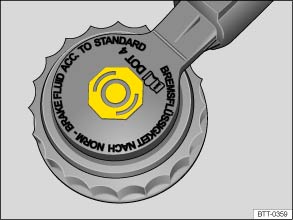Volkswagen Tiguan Owners Manual: Brake fluid

Fig. 136 In engine compartment: Brake fluid reservoir cap
 Read and follow the introductory information and
safety information first⇒
Read and follow the introductory information and
safety information first⇒ Introduction
to the subject
Introduction
to the subject Brake fluid absorbs water from the air over time. Too much water
in the brake fluid will damage the brake system. Water also lowers the boiling point
of the brake fluid. Too much water in the brake fluid can cause vapor lock during
heavy brake use or hard braking. Vapor lock reduces braking performance, increases
stopping distances and can even cause total brake failure. Your safety and the safety
of others depends on brakes that are working properly at all times ⇒ .
.
Brake fluid specifications
Volkswagen has developed a special brake fluid that is optimized for the brake system in your Volkswagen. Volkswagen recommends that you expressly use brake fluid that conforms to quality standard VW Standard 501 14 for optimum performance of the brake system. Check the information on the container for the brake fluid you want to use to make sure it meets the requirements for your vehicle.
Brake fluid that complies with VW Standard 501 14 can be purchased from your authorized Volkswagen dealer or authorized Volkswagen Service Facility.
If this special brake fluid is not available you may – under these circumstances
– use another high-quality brake fluid that complies with U.S. Federal Motor Vehicle
Safety Standard (FMVSS) 116 DOT 4 ⇒ .
.
Please note, however, that not all brake fluids that comply with U.S. Federal Motor Vehicle Safety Standard FMVSS 116 DOT 4 have the same chemical composition. Some of these brake fluids can contain chemicals that could, over time, degrade or damage internal parts of the vehicle’s brake system.
Volkswagen therefore recommends that you use brake fluid that expressly complies with VW Standard 501 14 for optimum brake system performance over the long term.
Brake fluid level
The fluid level in the transparent brake fluid reservoir must always be between
the MIN and MAX marking ⇒ .
.
On some vehicles, engine components block the view of the brake fluid reservoir and make it impossible to see the brake fluid level. If you cannot clearly see the brake fluid level in the brake fluid reservoir, please see an authorized Volkswagen dealer or authorized Volkswagen Service Facility.
The brake fluid level drops slightly when the vehicle is being used as the brake pads wear and the brakes are automatically adjusted.
Changing brake fluid
Brake fluid must be changed according to the service schedule in your ⇒BookletWarranty and Maintenance,. Have the brake fluid checked by an authorized Volkswagen dealer or an authorized Volkswagen Service Facility. Refill only with new brake fluid that meets the standards listed above.

 Warning
Warning
- Check the brake system and brake fluid level regularly.
- Always change the brake fluid according to the service schedule in your ⇒BookletWarranty and Maintenance,.
- Hard braking with old brake fluid may cause vapor lock. Vapor lock reduces braking performance, increases stopping distances and can even cause total brake failure.
- Always make sure that only the correct brake fluid is used. Only use brake fluid that expressly conforms to VW Standard 501 14 or if it is not available, only use a high-quality brake fluid that conforms to U.S. Standard FMVSS 116 DOT 4 requirements.
- Using another brake fluid, or one that is not of high quality, can impair the function of the brake system and reduce its effectiveness. If the container does not say that the brake fluid complies with VW Standard 501 14, or U.S. Standard FMVSS 116 DOT 4, do not use it.
- The brake fluid must be new.

 Warning
Warning
- To reduce the risk of poisoning, never use food, beverage or other non-original containers to store brake fluid. Someone might be misled by the original label on the container, or by the shape of the container, and drink the brake fluid. This could occur even if you relabel the container as brake fluid.
- Only store brake fluid in the closed, original container and keep it out of the reach of children.

 Note
Note

 Braking assistance systems
Braking assistance systems
Read and follow the introductory information and
safety information first⇒Introduction
to the subject The ESC, ABS, BAS, ASR, and EDL braking assistance systems work
only when the engine is ...
See More:
Volkswagen Tiguan Owners Manual > Luggage compartment: Variable luggage compartment floor
Fig. 103 In the luggage compartment:
Opening and securing the variable luggage compartment floor.
Fig. 104 Extending the luggage compartment
floor forward or downward.
Read and follow the introductory information and
safety information first⇒Introduction
to the subject Opening and clos ...
Volkswagen Tiguan Owners Manual
Volkswagen Tiguan Service and Repair Manual
- Body exterior
- Body Interior
- General Paint Information
- Paint
- Brake System
- Suspension, Wheels, Steering
- Wheel and Tire Guide
- Towing Guide
- Wheel and Tire Guide General Information
- Communication
- Electrical Equipment General Information
- Electrical Equipment from 06/2011
- Heating, Ventilation and Air Conditioning
- Refrigerant R134a Servicing
- 6-Speed Manual Transmission 02Q, OBB, and OFB

